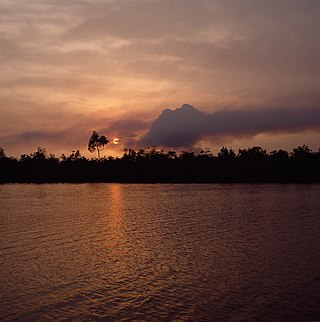
The Ijaw people, otherwise known as the Ijo people, are an ethnic group found in the Niger Delta in Nigeria, with significant population clusters in Bayelsa, Delta, and Rivers. They also occupy Edo, Ondo, and parts of Akwa Ibom. Many are found as migrant fishermen in camps as far west as Sierra Leone and as far east as Gabon. They account for about 4% of the Nigerian population according to CIA Factbook. The Ijaws are unarguably the most populous tribe inhabiting the Niger Delta region and arguably the fourth largest ethnic group in Nigeria.

The Niger Delta is the delta of the Niger River sitting directly on the Gulf of Guinea on the Atlantic Ocean in Nigeria. It is located within nine coastal southern Nigerian states, which include: all six states from the South South geopolitical zone, one state (Ondo) from South West geopolitical zone and two states from South East geopolitical zone.

The Ogonis are a people in the Rivers South East senatorial district of Rivers State, in the Niger Delta region of southern Nigeria. They number just over 2 million and live in a 1,050-square-kilometre (404-square-mile) homeland which they also refer to as Ogoniland. They share common oil-related environmental problems with the Ijaw people of the Niger Delta.

Bayelsa is a state in the South South region of Nigeria, located in the core of the Niger Delta. Bayelsa State was created in 1996 and was carved out from Rivers State, making it one of the newest states in the federation. The capital, Yenagoa, is susceptible to high risk of annual flooding. It shares a boundary with Rivers State to the east and Delta State to the north across the Niger River for 17 km and the Forçados River for 198 km, with the waters of the Atlantic Ocean dominating its southern borders. It has a total area of 10,773 square kilometres (4,159 sq mi). The state comprises eight local government areas: Ekeremor, Kolokuma/Opokuma, Yenagoa, Nembe, Ogbia, Sagbama, Brass and Southern Ijaw. The state is the smallest in Nigeria by population as of the 2006 census. Being in the Niger Delta, Bayelsa State has a riverine and estuarine setting, with bodies of water within the state preventing the development of significant road infrastructure.

Nigeria is the second largest oil and gas producer in Africa. Crude oil from the Niger Delta basin comes in two types: light, and comparatively heavy – the lighter has around 36 of API gravity while the heavier has 20–25 of API gravity. Both types are paraffinic and low in sulphur. Nigeria's economy and budget have been largely supported from income and revenues generated from the petroleum industry since 1960. Statistics as at February 2021 shows that the Nigerian oil sector contributes to about 9% of the entire GDP of the nation. Nigeria is a major exporter of crude oil and petroleum products to the United States of America. In 2010, Nigeria exported over one million barrels per day to the United States, representing 9% of the U.S. total crude oil and petroleum products imports and over 40% of Nigeria exports.
The Niger Delta People's Volunteer Force (NDPVF) is one of the largest armed groups in the Niger Delta region of Nigeria and is composed primarily of members of the region's largest ethnic group—the Ijaw people. The group was founded in 2004 in an attempt to gain more control over the region's vast petroleum resources, particularly in Delta State. The NDPVF has frequently demanded a greater share of the oil wealth from both the state and federal government and has occasionally supported independence for the Delta region. Until 2005 the group was spearheaded by Alhaji Mujahid Dokubo-Asari, who is viewed by many Delta residents as a folk hero.
Asari-Dokubo, formerly Melford Dokubo Goodhead Jr. and typically referred to simply as Asari, is a major political figure of the Ijaw ethnic group in the Niger Delta region of Nigeria. He was president of the Ijaw Youth Council for a time beginning in 2001 and later founded the Niger Delta People's Volunteer Force which would become one of the most prominent armed groups operating in the Niger Delta region. He is a Muslim with populist views and an anti-government stance that have made him a folk hero amongst certain members of the local population.
Ateke Tom is a traditional ruler and the first Amanyanabo of Okochiri Kingdom, who was the former leader of the Niger Delta Vigilante, an ethnic Ijaw militia in the Niger Delta region of Nigeria. In August 2007, following days of gun fights between various militia groups and security forces in Port Harcourt, Ateke Tom wrote to the Governor of Rivers State Celestine Omehia, requesting amnesty in response to an offer of clemency and rehabilitation the government had offered to militia who surrendered.

The current conflict in the Niger Delta first arose in the early 1990s over tensions between foreign oil corporations and a number of the Niger Delta's minority ethnic groups who feel they are being exploited, particularly the Ogoni and the Ijaw. Ethnic and political unrest continued throughout the 1990s despite the return to democracy and the election of the Obasanjo government in 1999. Struggle for oil wealth and environmental harm over its impacts has fueled violence between ethnic groups, causing the militarization of nearly the entire region by ethnic militia groups, Nigerian military and police forces, notably the Nigerian Mobile Police. The violence has contributed to Nigeria's ongoing energy supply crisis by discouraging foreign investment in new power generation plants in the region.
The Niger Delta Congress (NDC) is a socio-political organization of the ethnic nationalities of the Niger Delta region. The NDC was established on 26 December 2019 in Port-Harcourt, Rivers State, to serve the purpose of uniting the minority nationalities of the Niger Delta region as a means to achieving political and economic autonomy for the peoples of the region. The NDC is under the leadership of an executive council that comprises representatives of the different nationalities that make up the region. The current executive of the NDC which is in acting capacity is led by Nubari Saatah as President, and Mudiaga Ogboru as its National Spokesperson.
Major Isaac Jasper Adaka Boro, fondly called "Boro", was a Nigerian nationalist and soldier of Ijaw descent. He is considered a pioneer of minority rights activism in Nigeria.
Ijaw Youth Council is a civil rights organization in Nigeria, founded in 1998, which supports the interests of the Ijaw ethnic group of the Niger Delta. At the point of the establishment of the IYC, leadership of the organization spread across the Nigerian states where the Ijaw people resides. Hence, in the South-South Nigeria, Pronto Douglass led the IYC while Pere Camfo was the leader of the IYC in Ondo State From 2001 to 2004, it was headed by Mujahid Dokubo-Asari, until Asari split from the movement to found the Niger Delta People's Volunteer Force.
Egbesu is the deity of justice of the Ijaw people of the Niger Delta region. Egbesu is also perceived as the spiritual foundational force for combating evil. The Egbesu force can only be used in defence or to correct an injustice, and only by people who are in harmony with the universe. The symbols of the divine force are the leopard, panther, and lion. Egbesu has both a philosophical and spiritual dimension, the latter of which has been more prominent during recent times due to conflicts in regions where the Ijaw reside.
The Warri Crisis was a series of conflicts in Delta State, Nigeria between 1997 and 2003 between the Itsekiri, the Ijaw, and the Urhobo ethnic groups. Over 200,000 people were displaced by the Warri conflict between 1999 and 2006. Over 700,000 people were displaced during this period by violence in Delta State overall.
Cletus Komena Emein was Governor of Niger State in Nigeria from 9 Dec 1993 to 22 Aug 1996. He became a member of the Niger Delta Committee, tasked with solving the endemic violence in the oil-producing region, in September 2008.
Lt. Colonel (retired) Paul Edor Obi was Administrator of Bayelsa State, Nigeria from July 1998 to May 1999 during the transitional regime of General Abdulsalami Abubakar.

The Kingdom of Warri, Warri Kingdom or Iwere Kingdom, was established in 1480, was part of the Nigerian traditional states its ancestral capital is based in Ode-Itsekiri, Warri South LGA, Delta State, Nigeria with a palace erected in 1950s in the heart of the city of Warri, Warri South LGA, Delta State, Nigeria.

Kingsley Kuku is a Nigerian political and environmental rights activist, the special adviser to former President Goodluck Jonathan of Nigeria on Niger Delta Affairs and the chairman of the Presidential Amnesty Programme.
The Kaiama Declaration was issued by the Ijaw Youth Council (IYC) of Nigeria on 11 December 1998 to attribute the political crisis in Nigeria to the struggle for the control of oil mineral resources, while asserting that the degradation of the environment of Ijawland by transnational oil companies and the Nigerian State arise mainly because Ijaw people have been robbed of their natural rights to ownership and control of their land and resources. The council was formed in the town of Kaiama after 5,000 Ijaw people representing over 40 Ijaw clans, chose to articulate their aspirations for the Ijaw people, and to demand an end to 40 years of environmental damage and underdevelopment in the region.
The 2016 Niger Delta conflict is an ongoing conflict around the Niger Delta region of Nigeria in a bid for the secession of the region, which was a part of the breakaway state of Biafra. It follows on-and-off conflict in the Christian-dominated southern Niger Delta in the preceding years, as well as an insurgency in the Muslim-dominated northeast.






